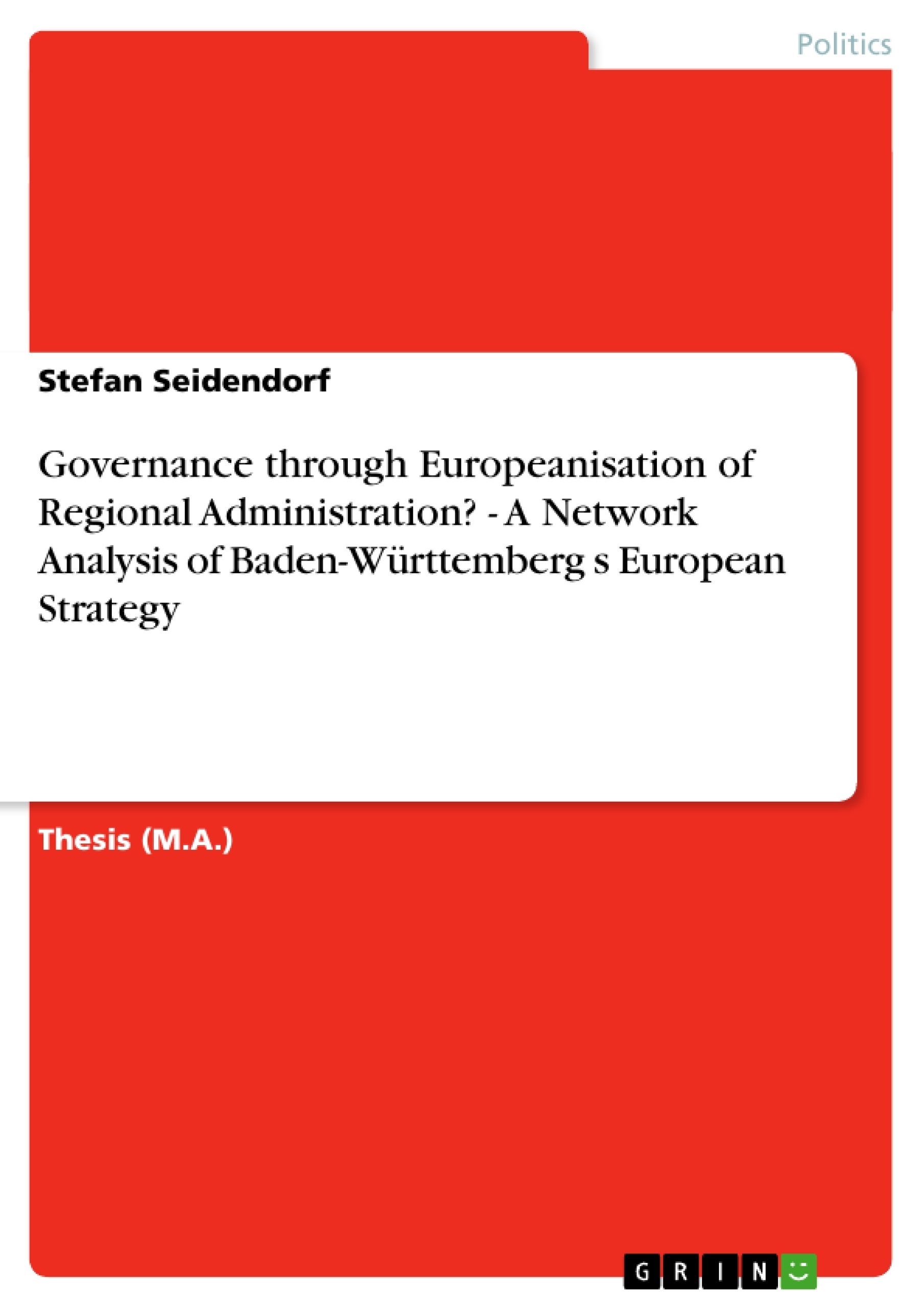Abstract
This paper investigates on the regions in Europe. It focuses on the role of the Brussels Office and takes an empirical approach via two case studies. The first chapter deals with theoretical considerations. The nature and definition of "policy-networks" are introduced by the models of Rhodes and Marsh. The importance of dependency of the different networking actors on each other is illustrated. To assess an actor within the network, one has to understand the extent to which he can control and mobilize resources. However, limits of this approach (concentration on participants, not on influence) are shown.
Secondly, the implications of globalisation and europeanisation for the regions are shown. The new complexity makes the region deal directly with the European level. Within this multi-level-governance, the mobilisation of regional resources is crucial. Civil society plays an important part. The question if these changes towards europeanisation of the administration are "new governance" is raised. The limits of this concept are assessed. When governance means steering processes rather than controlling territory, this may well occur in networks. The question nevertheless of the legitimacy of these networks remains.
Thirdly, the role of the Regional Office is presented with the historic reasons for its establishment and the evolution of its role. A distinction between the "Early-Warning-Function" and the "Platform-Function", is made. The first case concerns the gathering of information on Commission proposals and the way to deal with these informations. The project of a regional European human resources strategy is evoked. In building up a "Euro-pool", the region creates the necessary human resources to send experts into the Commission as well as having the opportunity to "take Europe home".
To be present as a state actor on the European scene, the region needs a platform provided by the regional office. One promising way is the added value of transnational interest-coalitions. Accordingly, the two case studies belong one to the field of Early Warning, another one to the region as a European actor. With consideration of the project of Beate Kohler-Koch, the specific features of the "Baden-Württemberg-Network" are presented and two appropriate cases defined.
[...]
Inhaltsverzeichnis (Table of Contents)
- Theoretical considerations
- Globalisation and Europeanisation
- The Role of the Regional Office
- The Early Warning Function
- The Platform Function
- Case studies
- Case 1: Public Transport
- Case 2: Women in Rural Space
- Analysis of the Case Studies
- Political Level
Zielsetzung und Themenschwerpunkte (Objectives and Key Themes)
This paper examines the role of regional representation in European governance, particularly focusing on the Baden-Württemberg region in Germany and its engagement with the European Union. The study utilizes network analysis to understand how the region leverages its Brussels office to influence policy and build partnerships. It considers the impact of globalization and European integration on regional administration and investigates the concept of "governance" as a process of steering rather than controlling territory.
- The role of regional representation in European policy-making
- The impact of globalization and European integration on regional administration
- The concept of "governance" and its application to regional networks
- The role of the regional office in influencing EU policies
- The importance of transnational cooperation and networking
Zusammenfassung der Kapitel (Chapter Summaries)
- The first chapter introduces theoretical considerations, defining "policy-networks" through the models of Rhodes and Marsh. It highlights the importance of resource dependency among actors within these networks. The chapter also discusses the limitations of focusing solely on network participants and the need to consider influence as well.
- The second chapter explores the implications of globalization and European integration for regions, emphasizing the increasing need for regional engagement with the EU level. It argues that the mobilization of regional resources is crucial in the context of multi-level governance and highlights the role of civil society.
- The third chapter focuses on the role of the regional office, tracing its historical development and examining its "Early Warning Function" and "Platform Function." The chapter presents two case studies: one illustrating the region's response to a Commission proposal on public transport and the other showcasing its proactive involvement in a project on women in rural space.
- The fourth chapter analyzes the two case studies and draws conclusions about the region's performance in Brussels. It discusses the importance of a political level that can benefit from the achievements of the regional representation's performance in Brussels.
Schlüsselwörter (Keywords)
The study revolves around key concepts such as regional representation, network analysis, multi-level governance, Europeanization, the Baden-Württemberg region, the Brussels office, policy-networks, and transnational cooperation. It also explores the concept of "governance" as a process of steering and its implications for regional administration.
Frequently Asked Questions
What is the role of the Baden-Württemberg Brussels Office?
The Brussels Office serves as a regional representation to influence EU policy-making, gather early information, and provide a platform for transnational cooperation.
What is the 'Early Warning Function' in regional governance?
It involves gathering information on upcoming EU Commission proposals at an early stage to allow the region to react and influence the legislative process before it is finalized.
How does Europeanization affect regional administration?
Europeanization forces regions to deal directly with the European level, requiring them to mobilize their own resources and experts within multi-level governance networks.
What are 'policy-networks' in the context of the EU?
They are structures of networking actors (regional, national, and EU levels) who depend on each other for resources and information to shape political outcomes.
What is the 'Platform Function' of a regional office?
It provides a base for the region to act as an international player, building interest coalitions and showcasing regional projects on a European stage.
Why is transnational cooperation important for regions?
By forming coalitions with other European regions, a single region can increase its influence and add value to its specific policy objectives in Brussels.
- Quote paper
- Stefan Seidendorf (Author), 2001, Governance through Europeanisation of Regional Administration? - A Network Analysis of Baden-Württemberg s European Strategy, Munich, GRIN Verlag, https://www.grin.com/document/7582



